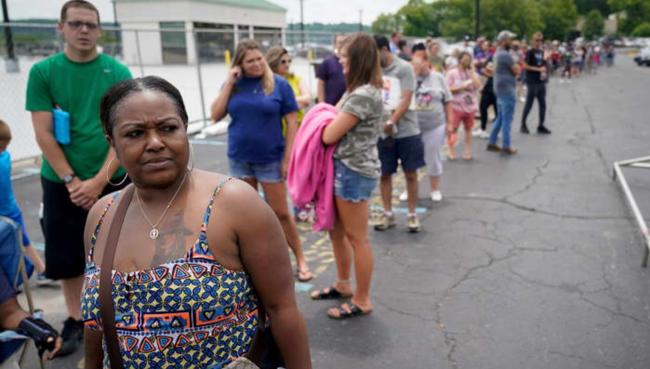Democrat Proposes Tying $1,500 Stimulus Checks To COVID Vaccinations Tyler Durden Tue, 12/08/2020 - 15:05
With Democrats and Republicans still stuck at an impasse on stimulus negotiations, one Maryland Congressman and erstwhile presidential candidate named John Delaney has engineered a novel strategy for killing two birds with one stone: dispersing another round of stimulus funds, while ensuring that enough Americans consent to receiving the vaccine that the US can quickly top the roughly 70% immunity threshold at which point scientists believe the vaccine will stop propagating.
And that plan is: Offering Americans a $1,500 "incentive payment" to acquiesce to receiving both doses of the vaccine. Delaney argued that the plan would benefit all Americans, even those who still refuse, because it might help the country crush the virus more quickly.
"The faster we get 75% of this country vaccinated, the faster we end Covid and the sooner everything returns to normal," Delaney said in an interview with CNBC.com.
To be sure, Delaney's plan has virtually zero chance of becoming law. Republicans and Democrats can't even seem to agree on basic things like the size of the package ($600BN or $900BN) and whether businesses deserve a liability shield to stop them from being sued by people claiming to have been infected in their establishment (GOP leader Mitch McConnell sees this as a must). President Trump recently promised Americans that the vaccine wouldn't be mandatory.
Delaney initially conceived of the scheme as a workaround for the widespread public skepticism about the vaccine. While recent opinion polls show that the number of Americans planning to get the vaccine as soon as it's available has been on the upswing, more than 40% of the population either has already been infected, doesn't see any urgent need for a vaccine, or simply doesn't trust the data.
It's also the latest indication that public health officials are anxious that the vaccine won't have enough credibility to convince enough Americans to accept it. With so much at stake, it makes sense that some other "incentives" might be considered.
Others, including some industry leaders and lobbyists, are even threatening to make accepting the vaccine mandatory for employees to return to work. Presumably, those who refuse won't be allowed to return, effectively tying their ability to earn a living to their acceptance of a COVID-19 vaccine and/or their ability to get one (since a "black market" for doses is almost assured, particularly after Pfizer and Moderna have warned they won't be able to deliver any additional doses until mid-2021 (this, just days after Pfizer cut its end-2021 delivery target by 50% due to issues with raw materials).
Delaney told CNBC that Americans are going to need some kind of an incentive to encourage them to take the vaccine.
“We have to create, in my judgment, an incentive for people to really accelerate their thinking about taking the vaccine,” Delaney said. To be sure, those who are not comfortable receiving the vaccine would not be forced to do so.
Though he reckoned that even those who refuse to participate will still benefit from the program, which he said could cost roughly $380MM, because once COVID is eradicated, everybody will benefit.
“If you’re still afraid of the vaccine and don’t want to take it, that’s your right,” Delaney said. “You won’t participate in this program. “But guess what?” he added. “You’re going to benefit anyhow, because we’ll get the country to herd immunity faster, which benefits you. So I think everyone wins.”
To be sure, while Delaney's plan might seem workable on the surface, experts pointed out that it would likely be difficult and costly to pull off.
Some experts are skeptical that such a plan could work. “It’s an interesting idea,” said Bill Hoagland, senior vice president at the Bipartisan Policy Center and a former Senate staffer, however, he felt it would be wrong to tie people's stimulus checks to vaccine timetable, given the initial shortage of doses. Plus, the IRS's dated IT systems might buckle from the effort of cross-checking whether individuals actually had received their vaccinations before doling out the stimulus money.
Other countries, including Mexico, have used "incentive" payments like this to get their vaccination rate up. But as Delaney willfully admits, in the US, we already have a pretty strong system of incentives to encourage vaccinations, and what's more, it's mostly targeted at children: states have vaccination rules that require students to get their shots before they're allowed in a classroom.
So, why should the federal government spend all that money when there are other, cheaper, ways to pressure families into submitting?
http://dlvr.it/RnFXpH

No comments:
Post a Comment